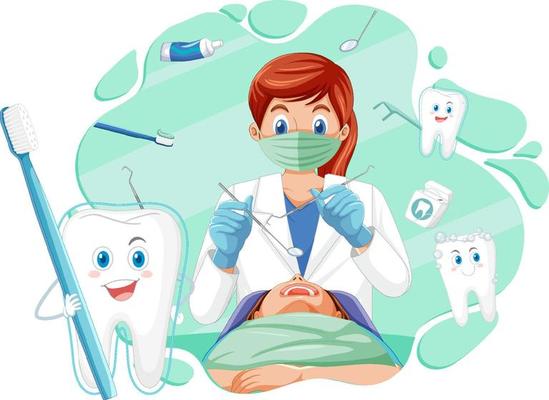Discover Regular Oral Concerns Your Dental Professional Can Fix
Recognizing constant dental issues is vital for preserving optimum dental health and wellness. Problems such as tooth cavities, gum tissue illness, tooth level of sensitivity, foul-smelling breath, and dental cavity prevail yet typically overlooked till they come to be serious. Dentists have the expertise to detect and treat these conditions, thus protecting against further problems. Regular dental visits and personalized treatment strategies can deal with these issues effectively, making certain a much healthier and brighter smile. However what certain treatments do dentists use to fight these issues, and just how can early intervention make a distinction? The response to these concerns offer useful understandings into guarding your oral wellness.
Cavities
Dental caries, likewise called cavities, are a common dental health and wellness concern triggered by the demineralization of tooth enamel as a result of acid production from bacterial plaque. This procedure begins when germs in the mouth metabolize sugars and starches from food, producing acids that erode the enamel. Otherwise dealt with promptly, this disintegration can penetrate much deeper into the tooth, impacting the dentin and eventually the pulp, possibly leading to serious discomfort and infection.
The onset of dental caries formation frequently existing as white areas on the tooth surface, showing first demineralization. As the process advances, these places can turn into black or brownish lesions, signifying a lot more comprehensive decay. Routine oral examinations are essential for very early detection, as tooth cavities in their incipient stages can be treated with remineralization methods, such as fluoride treatments.
Once a dental caries has actually formed, corrective treatment is necessary. Dental professionals typically eliminate the corroded section of the tooth and fill the dental caries with products such as composite material, amalgam, or ceramic. In extra severe cases, a crown or origin canal therapy may be needed. Safety nets, consisting of good oral health practices and dietary adjustments, play a pivotal role in reducing the risk of tooth cavities.
Gum Tissue Illness
While tooth cavities represent a significant issue for oral health, an additional essential concern that requires attention is gum disease. Additionally called periodontal disease, gum condition is an inflammatory problem impacting the tissues bordering and supporting the teeth. It is primarily created by the build-up of plaque-- a sticky film of microorganisms that bases on teeth.
Gum disease advances through phases, beginning with gingivitis, identified by inflammation, swelling, and bleeding gum tissues (dentist eugene oregon). If left unattended, gingivitis can intensify to periodontitis, where the inner layer of the periodontal and bone pull away from the teeth, creating pockets that become contaminated. Gradually, the toxins created by the bacteria damage down the bone and connective tissue that hold teeth in position, potentially bring about missing teeth
Very early detection and treatment are essential. Expert dental cleanings and boosted dental hygiene practices, such as cleaning twice day-to-day and flossing, can take care of gingivitis. For more innovative stages, treatments might include scaling and origin planing, anti-biotics, and even medical interventions.
Routine oral check-ups play a crucial role in protecting against and managing gum illness. Dental practitioners can identify early indicators and recommend suitable treatments, making certain the maintenance of healthy periodontals and total dental wellness.
Tooth Level Of Sensitivity
Tooth sensitivity affects countless people worldwide, offering an usual yet often stressful dental problem. This problem occurs when the enamel, the outer safety layer of the teeth, is endangered, disclosing the underlying dentin. The dentin includes tiny tubules that lead straight to the oral pulp, where nerves live. When exposed to stimulations such as warm, cold, pleasant, or acidic compounds, these nerves are activated, creating sharp pain or discomfort.
Several aspects add to enamel erosion and succeeding tooth level of sensitivity, consisting of aggressive cleaning, acidic foods and drinks, periodontal economic downturn, and bruxism (teeth grinding) Additionally, dental procedures such as teeth bleaching can briefly heighten sensitivity.
Foul Breath
An additional prevalent oral issue that influences individuals' Click Here day-to-day lives is bad breath, medically described halitosis. This problem can be specifically distressing, impacting individual communications and self-esteem. Halitosis commonly stems from poor oral hygiene, which allows food particles to remain in the mouth, promoting microbial growth. These bacteria create sulfur compounds, causing undesirable odors.

Suggestions might include improving dental health techniques, such as routine cleaning and flossing, making use of antibacterial mouthwashes, remaining moisturized, and dealing with any dental concerns. Reliable monitoring of bad breath not only enhances dental wellness but also dramatically enhances high quality of life.
Dental Caries

Avoiding dental caries includes a mix of excellent dental health practices and regular dental examinations. Brushing teeth at the very least twice daily with fluoride toothpaste, flossing to eliminate plaque in between teeth, and restricting the consumption of sweet foods and beverages are crucial safety nets. Fluoride treatments, dental sealants, and professional cleanings offered by a dental practitioner can likewise play a significant role in fortifying enamel and preventing decay.
Dental professionals can eliminate corroded cells and restore the tooth with fillings made from products such as composite material, amalgam, or porcelain. By dealing with tooth degeneration without delay, dental experts help maintain dental structure and feature, guaranteeing long-term dental health.
Verdict
Addressing common dental issues such as tooth cavities, gum illness, tooth sensitivity, negative breath, and dental caries is crucial for keeping optimal dental health and total well-being. browse this site Dental practitioners possess the proficiency to detect and treat these problems effectively, making sure tailored care for each person. Routine oral check-ups and safety nets are crucial in identifying and handling these problems early, promoting a much healthier and more confident smile over a lifetime.

Tooth degeneration, likewise recognized as dental cavities, takes place when the enamel, the outermost layer of the tooth, is worn down by acids created by bacteria in the mouth. Cleaning teeth at least twice daily with fluoride toothpaste, flossing to eliminate plaque in between teeth, and limiting the intake of sugary foods and beverages are essential precautionary procedures.Attending to common oral issues such as dental caries, periodontal disease, tooth sensitivity, poor breath, and tooth decay is important for keeping optimum dental health and overall wellness.